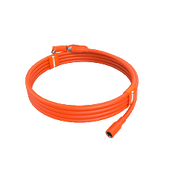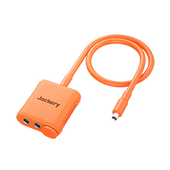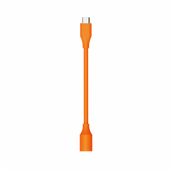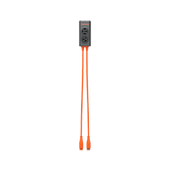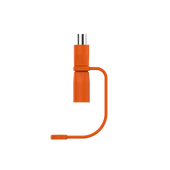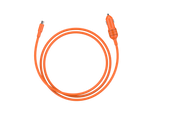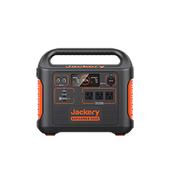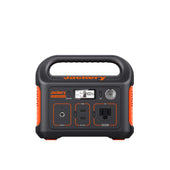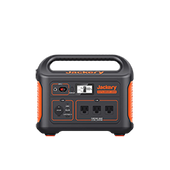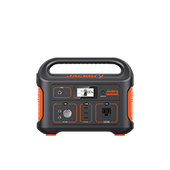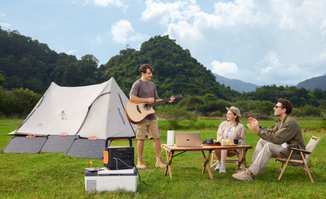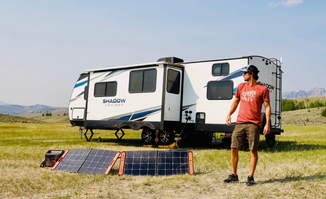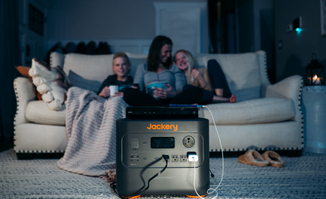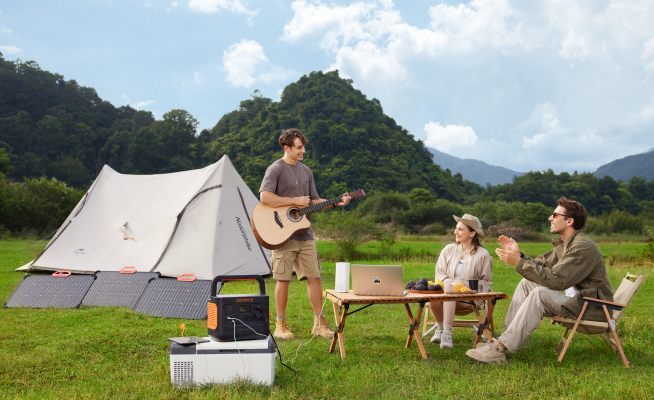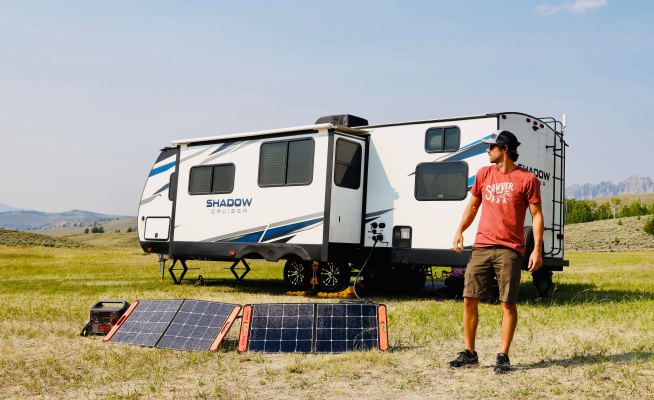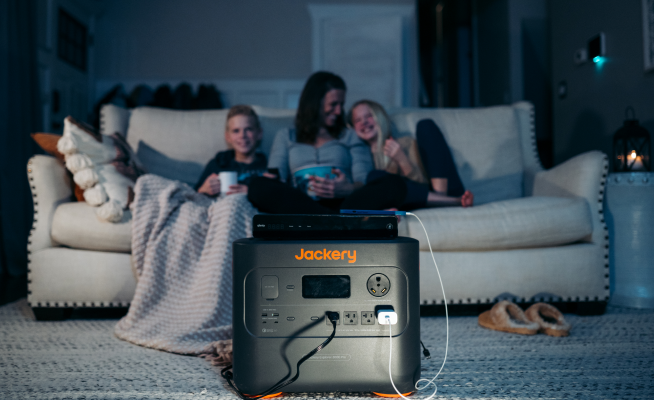Solar Powered Tiny House: Can Solar Generator Run A Tiny House
Many US people are now moving into tiny homes to reduce environmental impact and practice sustainable living. However, when it comes to fulfilling the dream of living in small homes, it's vital to understand how to power it. Solar-powered tiny houses are eco-friendly and cost-efficient solutions to eliminate high power bills and reduce carbon footprint.
However, it is critical to choose the right power solution. Generally, solar-powered tiny houses consume only 7% of the energy consumed in an average traditional home. A small home with all essential appliances will consume around 3-4 kilowatts of electricity per day. Jackery Solar Generators with a large battery capacity are designed to support the power needs of tiny homes.

Depending on your specific needs, you can choose the right size solar generator. In this guide, we will uncover what a solar-powered tiny house is and which solar generator is suitable to charge it.
What Is A Solar Powered Tiny House?

A solar-powered tiny home is a small home that uses solar energy. Instead of being connected to the electricity grid, the tiny home is powered using a solar system. The solar panels convert electricity into solar energy, whereas the battery attached helps store the unused power for later use. Below are a few benefits of living in a tiny home charged with solar power.
- Using solar energy to run a tiny home helps you to save high on electricity costs.
- As tiny homes require fewer resources and less space, it helps you to reduce your carbon footprint.
- Many tiny homes are mobile, so you can keep traveling with your home, similar to RV trips, without worrying about electricity.
- As tiny solar houses are not dependent on the utility company, you can eliminate the stress of blackouts or power outages.
The Types Of Solar-Powered Tiny Houses
Generally, there are two types of solar-powered systems for tiny houses — off-grid and grid-tied. Let us briefly discuss the two kinds of systems for a tiny solar house.
Off-Grid Solar-Powered Tiny House
An off-grid system means complete independence from the electric grid. In this type, you generate power from a solar system or other energy alternatives.
Many people prefer off-the-grid living, as it helps them reduce reliance on the electricity grid and reduces soaring electricity bills. An off-grid solar power system consists of solar panels that convert sunlight into electricity and batteries to store extra energy.
An efficient and powerful off-grid generator can provide electricity to charge all home appliances for long hours.
Grid-Tied Solar-Powered Tiny House
Unlike off-grid systems, a grid-tied solar system is connected to the utility company network. One main difference between the off-grid and grid-tied systems is that the latter does not require a battery.
When solar panels do not produce enough electricity, it starts drawing power from the grid. The main disadvantage of choosing a grid-tied system is that it does not work during power outages.
You must invest in an additional battery system to keep your home powered during blackouts and brownouts.
Solar Powered Tiny House Vs. Solar Generator For Tiny House
When it comes to going solar, the two popular options are solar-powered tiny houses and solar generators for tiny houses. A solar-powered tiny house means connecting multiple solar panels that can convert sunlight to electricity and charge appliances.
For instance, if your tiny home consumes around 3000 watts of electricity, you'll have to connect multiple solar panels of 100 or 200 watts to meet the power needs.
Fortunately, that's not the case if you choose a solar generator for your solar tiny home. You can select Jackery Solar Generator 2000 Pro to power all appliances for long hours. The large battery capacity and highly efficient solar panels can charge 96% of most home appliances.

Below we compare solar-powered tiny homes and solar generators.
|
Types |
Features |
Pros |
Cons |
|
Solar Powered Tiny House |
Clean, renewable energy source. Easy to customize as per your needs. Reduce energy dependence. Electric bill savings. |
Energy-efficient solution. Reduction in high electricity bills. Affordable solution. |
Space constraints. Expensive compared to other solar solutions. Most solar tiny house systems do not come with batteries for power backup. |
|
Solar Generator For Tiny House |
Portable in design and lightweight. Highly efficient solar panels for maximum electricity conversion. High average life expectancy. |
Noiseless operation due to no moving parts. Easier to install and can power multiple appliances at once. Unlike fossil-fuel generators, solar generators are more convenient for outdoor trips. |
May produce less electricity during cloudy days. |
Solar-Powered Tiny House
Off-grid and grid-tied solar systems are the two main types of solar-powered tiny houses. Powering the home with solar energy saves costs and lowers the environmental impact.
Pros
- Tiny homes have low-power-consuming appliances, and installing solar panels enables you to eliminate most, or even all, of your utility bills.
- Solar panels offer clean and green energy, allowing you to minimize environmental impact and reduce your carbon footprint.
- Unlike hydroelectricity or wind power, solar panels have low upfront costs.
Cons
- Tiny houses are generally small. Therefore, installing multiple solar panels to meet energy needs can be challenging.
- Solar inverters are the additional component responsible for converting DC power into AC electricity. Placing an inverter in your tiny solar home, along with all other parts, can be tricky.
- Solar systems that do not have batteries make your home prone to blackouts and power outages.
Solar Generator For Tiny House
A solar generator is an ideal solution whether you want to charge one appliance, a tiny home, or a traditional house. It is a system that runs on solar power and uses a combination of solar panels and a power station.
The solar power panels convert sunlight into electricity which is then passed through the charge controller in the power station. The inverter in the solar power station converts DC into AC current to charge all electrical appliances.
Jackery Solar Generators are powerful and compact powering solutions for your charging needs. The multiple USB ports, AC outlets, and carports allow you to power numerous devices simultaneously.

In addition, the pass-through charging feature allows you to charge appliances while keeping the solar panels plugged into the generator. Depending on the power needs of your solar tiny house, you can choose the Jackery Solar Generator Pro series with models including Jackery Solar Generator 1000 Pro, 1500 Pro, or 2000 Pro.
Pros
- Unlike traditional gas generators, solar generators use free fuel from the sun.
- As solar generators entirely rely on renewable energy, you don't have to worry about the environmental impact or the fossil fuel costs.
- Solar generators do not have any moving parts, making them noise-free.
- They are easy to use, efficient, and require minimal maintenance to work efficiently.
- Highly efficient solar panels can convert solar energy into electricity and store the energy into portable power stations.
Cons
- Though solar generators have low operating costs, they require a much higher initial investment.
How Many Watts Does A Tiny House Use?
Simply put, a watt is a measure of energy that determines how much power a device consumes in a specific period. On the other hand, watt-hour is the power consumed by the appliance in one hour.
Formula: Watts = Volts * Amps
A tiny house uses around 3-4kW of power per day. Therefore, you need a solar generator supplying your appliances with around 3-4kW or more power. The best way to determine the total watts of a tiny house is to calculate the power requirement of each device and then add them.
Note: You can find the wattage of each appliance on its label.
How Much Does It Cost To Run A Tiny House?
The cost to run a solar tiny house will depend on the solar system you are using. For instance, if you use a solar panel system, you will have to pay for an inverter, charge controller, solar panels, PV wire, and other crucial components. Here is the rough breakdown of costs for a solar-powered tiny house system.
|
Component of the solar panel system |
Costs |
|
Inverter |
$4500 |
|
Charge controller |
$1200 |
|
Control panel |
$300 |
|
Batteries |
$4000 |
|
Solar panels |
$4000 |
|
Breakers and boxes |
$800 |
|
Battery cabling |
$300 |
|
PV wire, house tether, and romex |
$500 |
|
Electrician (labor) |
$2000 |
The total cost of solar-powered solar panels will cost around $15,000-17,000. On the other hand, purchasing a solar generator will cost you nearly $3000-4000. Jackery Solar Generator 2000 Pro is available at $3,599. Not only is it powerful enough to power 95% of home appliances efficiently, but it is also a cost-effective choice.
How Much Solar Power Does A Tiny House Need?
The solar power needs of the tiny house will depend on the number of appliances you want to charge, their power requirements, and the time you run them. To help you understand better, we have listed some common home appliances and their estimated daily energy consumption.
|
Appliance |
Power (watts) |
Energy (watt-hour) |
|
LED lights |
6W |
24Wh |
|
Incandescent light |
60W |
240Wh |
|
Laptop |
Charging: 42W Running: 14W |
168Wh |
|
Cell phone |
5W |
15Wh |
|
Full-size fridge |
83W |
1000Wh |
|
Internet router |
6W |
72Wh |
|
Ultra-energy efficient fridge |
180W surge |
168Wh |
|
Solar booster pump |
100W |
50Wh |
|
Space heater |
Low: 600W Medium: 1000W High: 1500w |
8kWh |
|
Blender - conventional |
500W |
41Wh |
|
Blender - powerful |
1500W |
125Wh |
|
Radio |
1W |
6Wh |
|
Well pump (1HP) |
750W |
750Wh |
|
Window AC |
500-1500W |
8000Wh (average) |
Jackery Solar Generator For Tiny House
If you're considering using solar power to charge your tiny home, the Jackery Solar Generator is a trustworthy option. It boasts highly efficient SolarSaga Solar Panels that can convert maximum sunlight into electricity.

The Jackery Explorer Portable Power Stations are specifically designed to store the energy produced by solar panels and power multiple appliances for extended periods. For smaller homes, the Jackery Solar Generator 1000 Pro or 1500 Pro would suffice and power appliances for several hours.
However, if you're looking for a high-power charging solution, you may want to opt for the Jackery Solar Generator 2000 Pro with a battery capacity of 2160Wh.
|
Series |
Capacity |
Ports |
Tiny House Watts |
Working Hours |
|
1002 Wh |
AC Output: 120V, 60Hz, 1000W (2000W Peak) USB-A Output: Quick Charge 3.0, 18W Max USB-C Output: 100W Max, (5V, 9V, 12V, 15V, 20V up to 5A) Car Output: 12V, 10A AC Input: 120V, 60Hz, 15A Max DC Input: 12V-17.5V, 8A Max, Double to 16A Max. 17.5V-60V, 11A, Double to 22A/800W Max |
LED lights: 6W Laptop: 12W/24W Cell Phone: 5W Full-Size Fridge: 83W Blender: 500W Internet Router: 6W Radio: 1W Space Heater: 600W |
LED lights: 141H Laptop: 70H/35H Cell Phone: 170H Full-Size Fridge: 10H Blender: 2H Internet Router: 141H Radio: 851H Space Heater: 1H |
|
|
1512 Wh |
AC Output: 120V, 60Hz, 15A, 1800W (3600W Peak) USB-A Output: Quick Charge 3.0, 18W Max USB-C Output: 100W Max, (5V, 9V, 12V, 15V, 20V up to 5A) Car Output: 12V, 10A AC Input: 120V, 60Hz, 15A Max DC Input: 11V-17.5V, 8A Max, Double to 8A Max. 17.5V-60V, 12A, Double to 24A/1400W Max |
LED lights: 6W Laptop: 12W/24W Cell Phone: 5W Full-Size Fridge: 83W Blender: 500W Internet Router: 6W Radio: 1W Space Heater: 600W |
LED lights: 214H Laptop: 107H/53H Cell Phone: 257H Full-Size Fridge: 15H Blender: 2.5H Internet Router: 214H Radio: 1285H Space Heater: 2H |
|
|
2160 Wh |
AC Output: 120V, 60Hz, 2200W (4400W Peak) USB-A Output: Quick Charge 3.0, 18W Max USB-C Output: 100W Max, (5V, 9V, 12V, 15V, 20V up to 5A) Car Output: 12V, 10A AC Input: 120V, 60Hz, 15A Max DC Input: 11V-17.5V, 8A Max, Double to 8A Max 17.5V-60V, 12A, Double to 24A/1400W Max |
LED lights: 6W Laptop: 12W/24W Cell Phone: 5W Full-Size Fridge: 83W Blender: 500W Internet Router: 6W Radio: 1W Space Heater: 600W |
LED lights: 306H Laptop: 153H/76H Cell Phone: 367H Full-Size Fridge: 22H Blender: 3.5H Internet Router: 306H Radio: 1836H Space Heater: 3H |
Solar Powered Tiny House FAQs
What size of solar generator do I need to run a tiny house?
The solar generator's size depends on the appliances' number and wattage requirements. Here is a simple mathematical method to calculate the exact size.
Suppose you choose Jackery Solar Generator 2000 Pro with a battery capacity of 2160 Wh for your tiny home.
Working Time = Capacity in Wh × 0.85 / operating wattage of all the appliances
If your refrigerator consumes 300 watts, the working time will be:
2160 Wh × 0.85 / 300 W = 6 hours.
Similarly, you can calculate the working time of other applications depending on their watt requirements and add them to get the final watts consumed by your tiny home.
Note: Jackery Solar Generators have a pass-through charging feature. That means you can power the generator and the appliance simultaneously.
How many solar panels do I need for my tiny house?
The average solar-powered tiny home consumes 4kW or 4000 watts of electricity per day. If your area receives around 8 hours of electricity, you will need 4-5 solar panels with a capacity of around 100 watts to generate enough power for your house. Here we assume that one 100 watts solar panel produces 1kWh in 8 hours. However, that's not the case if you choose a solar generator.
Jackery Solar Generator 2000 Pro combines an Explorer Portable Power Station and SolarSaga 100W Solar Panels would be sufficient to run all the small and large appliances of your home. You can purchase two Jackery Solar Generator 2000 Pro, so you never run out of power.
Top considerations when powering a tiny house with solar power?
Before you choose any solar power for your home, you must analyze your energy requirements. A few essential points to include:
- Insulation: A fully insulated home consumes less electricity.
- Appliances: Calculate the number of small and large devices you wish to power.
- Weather Condition:The weather in your area has a more significant influence on the energy consumption of your home. You must consider the time you use AC or a heating device to determine the correct size solar system.
Final Thoughts
Solar power is a form of clean and renewable energy source that is cost-effective and practical for tiny homes. Buying a highly efficient solar generator is an excellent idea compared to a solar-powered tiny house with only solar panels. In addition, the solar generator is portable, making it suitable for mobile homes.
Additionally, it features a large-capacity battery to ensure you get enough electricity when sunlight is not shining. Jackery Solar Generators are robust powering solutions available in different sizes and capacities to meet your requirements.
You can choose Jackery Solar Generator 1000 Pro to power all essential home appliances, while Jackery Solar Generator 2000 Pro offers a higher power range to charge all larger devices.
Disclaimer:
The runtime mentioned for appliances powered by Jackery is for reference only. Actual runtime may vary under different conditions. Please refer to real-world performance for accurate results.







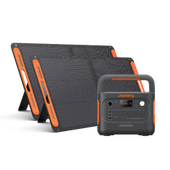



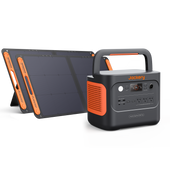

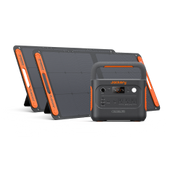
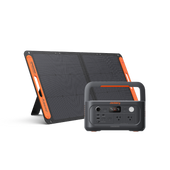
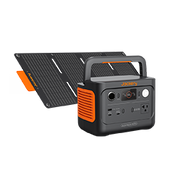
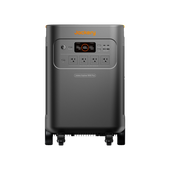

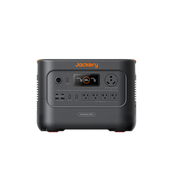
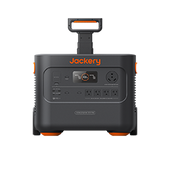
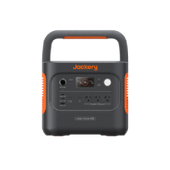
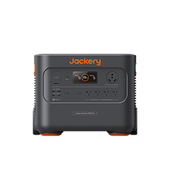

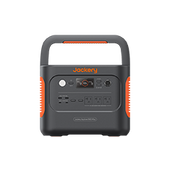
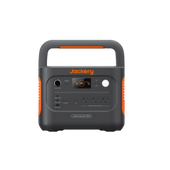
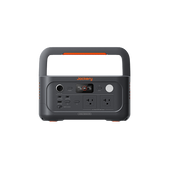

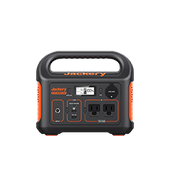
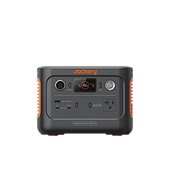
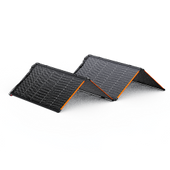
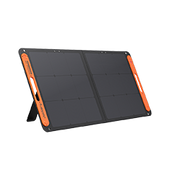

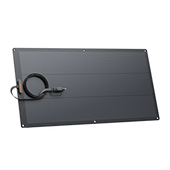
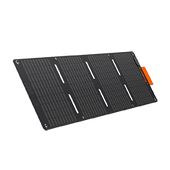
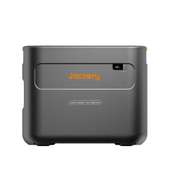
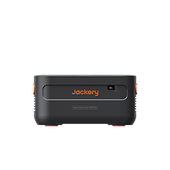
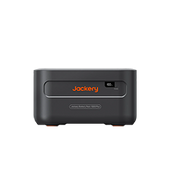
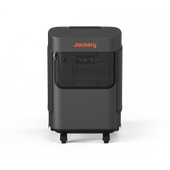
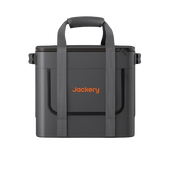
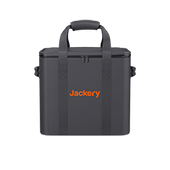
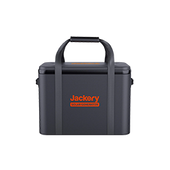
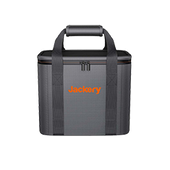
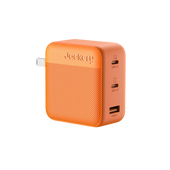
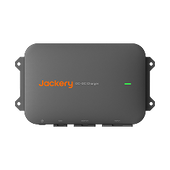
![[Add-on] Jackery Manual Transfer Switch for Explorer 5000 Plus](http://ca.jackery.com/cdn/shop/files/add-on-jackery-manual-transfer-switch-for-5000-plus-240V.webp?v=1757043692&width=170)
